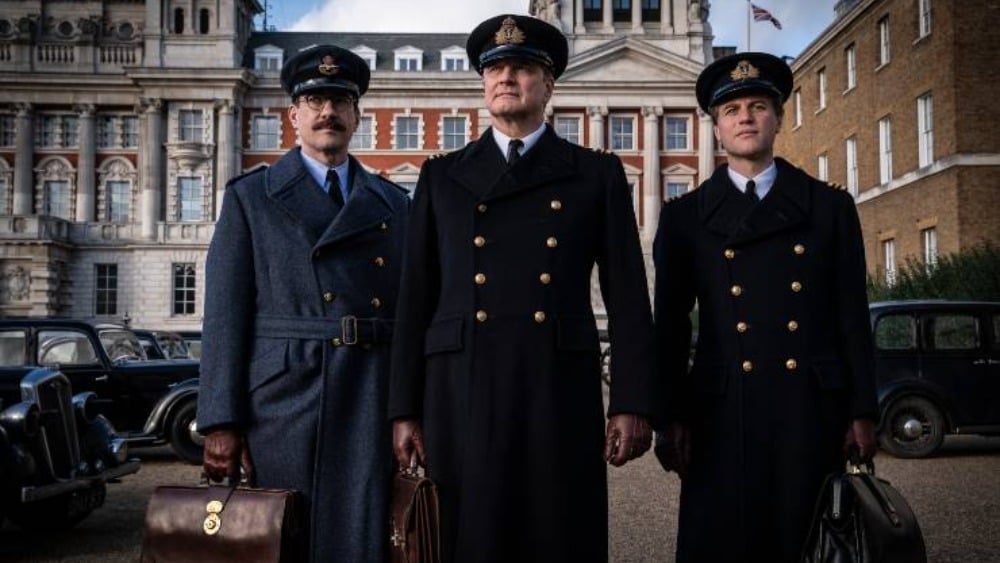Operation Mincemeat was an aptly absurd code name for what was, on the face of it, a preposterous British military mission: In 1943, with Allied forces planning to invade Sicily and wrest it from fascist Axis control, two intelligence officers conspired to convince the Nazis they were targeting Greece instead, pulling off the ruse with false documents and the stolen, dressed-up corpse of a fictitious British marine. It’s a true chapter of history that nonetheless sounds like a war film as dreamed up by Ealing Studios scriptwriters; it’s practically begging to be made into a farce, and sure enough, the gag-filled knockabout musical “Operation Mincemeat” hits London stages this very month. As coincidence would have it, the screen version of the same story arrives in U.K. cinemas near-simultaneously, though any similarities end there: stately and stiff-lipped, John Madden’s handsome film approaches its tall tale with a very British sense of decorum.
Not that the odd dry joke isn’t cracked in “Operation Mincemeat,” a war drama in which the conflict plays out not on body-strewn beaches but in smoke-filled London strategy rooms — as Churchill’s men wrestle with the burden of knowing the future of the free world might just rest on a hoax not a million miles removed from “Weekend at Bernie’s.” But Madden’s film, written by veteran TV scribe Michelle Ashford (“Masters of Sex,” “The Pacific”), is at pains to dignify the improbable project at every turn, beginning with a sternly florid voiceover reminding us at the outset that in war, “truth is surrounded by a bodyguard of lies.” Given that material and a tony cast of Britain’s finest — led by Colin Firth and Matthew Macfadyen, exactly the two actors you’d want for a high-stakes intelligence operation — this story of a diversion can hardly fail to be suitably diverting. But you can’t help wishing for a lighter touch behind the camera.
While Warner Bros. is giving “Operation Mincemeat” a full theatrical rollout on home turf, the film will be released to Netflix in the States — not an inappropriate strategy for a two-hour-plus film that, in its predominantly talky tenor and interior scope, could have worked no less successfully in miniseries form. For journeyman director Madden, whose subsequent films have never matched the fizz of “Shakespeare in Love,” this feels like a renewed bid for prestige status roughly akin to Joe Wright’s handling of “Darkest Hour,” another Churchill-administration drama playing out in low-lit, wood-paneled Whitehall chambers.
Here, the bulldog Prime Minister is more spoken of than seen, played by a cranky, crusty Simon Russell Beale in just a couple of scenes. It’s the invisible, undersung men of the intelligence division who take the dusty spotlight here, led by naval representative Ewen Montagu (Firth), introduced in a personal and professional tailspin when his wife and children leave for the safety of America — his marriage its own unresolved conflict. Distraction comes when he’s assigned to collaborate with shy, eccentric MI5 agent and former RAF lieutenant Charles Cholmondeley (Macfadyen), who has hatched a plan to deceive the Nazis with a strategically dumped, information-laden body in European waters — though several key details, not least among them Cholmondeley’s dead-giveaway code name Trojan Horse, have to be ironed out.
Frosty naval intelligence director John Godfrey (Jason Isaacs) is skeptical about the entire endeavor, though in the absence of any more workable plan, Montagu and Macfadyen are given the go-ahead to redevelop the renamed Operation Mincemeat. Joining them on the project are veteran secretary Hester Leggett (Penelope Wilton), enthusiastic MI5 clerk Jean Leslie (Kelly Macdonald) and Godfrey’s assistant, a certain aspiring writer named Ian Fleming (Johnny Flynn) — whose grandiloquent typed reflections on the whole affair provide the film’s running, somewhat overworked narration. The body of a recently deceased vagrant is secured from a drily complicit coroner (British sitcom favorite Paul Ritter, in his final role); with a bit of wit and imagination from all participants, the corpse is fashioned as that of one Royal Marine captain William Martin, set to be floated via submarine off the coast of Spain, with critical fake documents on his person, detailing a planned Allied invasion of Greece.
The pleasures of “Operation Mincemeat” largely lie in the intricate procedural mechanics of the deception itself, from the whimsical fashioning of convincing “pocket litter” (love letters, photographs and the like) for the imaginary captain to the knotty second-guessing and double-bluffing that ensues once the body is found. Working from a non-fiction book by Ben Macintyre, Ashford’s script is pleasingly detail-oriented and lightly droll on that front. It’s a shame, then, that the secondary human drama surrounding the mission feels comparatively contrived and perfunctory: A strenuously polite love story between Montagu and Leslie never lifts off the page, despite the combined charms of Firth and Macdonald, while a subplot involving the possibly duplicitous activities of Montagu’s suspected communist brother Ivor (Mark Gatiss) is itself a wayward diversion.
It’s Macfadyen, fresh off his career-peak work in TV’s “Succession,” who has the chewiest character here in Cholmondeley, a gentle lone wolf whose stoic sense of duty is occasionally at odds with his frustrated aspirations to alpha masculinity. (His lavish walrus mustache perhaps protests too much.) Quiet and occasionally acidic in his line readings, Macfadyen plays with a kind of mournful, pathetic nobility that would have made him a poignant comic hero. As it is, he’s the very odd man out that this otherwise by-the-book film — calmly proficient in all aspects from Sebastian Blenkov’s tea-stained lensing to Thomas Newman’s solemn, ticking-clock score — so desperately needs.
Love Film & TV?
Get your daily dose of everything happening in music, film and TV in Australia and abroad.
From Variety US































